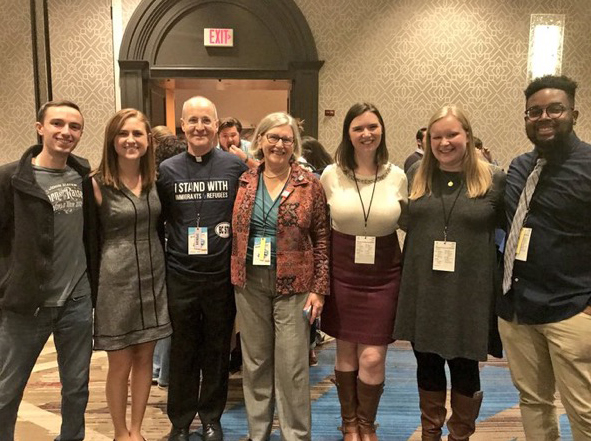
The Importance of Intentionality
Jeremiah Pennebaker
November 15, 2017
What do I owe to the generations coming after me?
I was always taught to “reach back as I forge ahead” in my life and that nobody gets to where they’re going without some help and guidance from those who came before them. So I try and take that to heart, especially when I’m in a position where I can speak about my experiences and expertise.
I had an opportunity to do just that this past weekend at the Ignatian Family Teach-In for Justice (IFTJ), a conference for members of the Ignatian network to come together to reflect and advocate for justice. Overall, it was a rewarding weekend of teaching, reflecting and discerning. My fellow NETWORK Associate Claudia Brock and I were tasked with educating various high school and college groups. We had the chance to talk to a multitude of young people who are motivated by their faith and values to engage in the political process throughout the weekend. Seeing their passion to learn about and do justice was very inspiring. At times I really felt that I was living up to that idea of helping those after me to move forward. I shared my knowledge and experience, provided them with insight on my position at NETWORK and told them how they can become NETWORK Associates one day.
What I failed to realize is that I would learn more from them than they would learn from me. The students at IFTJ taught me valuable lessons and inspired me to be a better pioneer for justice. I was particularly inspired at a session on what it means to be a feminist. I saw a big group of Black boys walk in, something I would have thought to be impossible, as it took me until my senior year of college to grasp the importance of feminism. So often I had heard and witnessed the lack of respect that men have for women — specifically in my friend circles– but to see a group of Black high school boys interested in feminism gave me some hope. I listened to a panel on immigration and heard one of the most heartbreaking stories of my life about a woman who lost her family to insidious immigration policies and procedures. I watched as the woman regained her resolve and spoke about how she continues to push forward even in the most daunting of situations.
I learned not only from hearing the experiences of others, but also by presenting at the conference. After my session on the Racial Wealth and Income Gap, I was critiqued by a young group of Black and brown students. Their feedback made me realize that I need to do better job of being intentional when I am attempting to “reach back as I forge ahead.” While presenting on the Racial Wealth and Income Gap, I made the mistake of only thinking about how my message impacts the white students in the audience. In my mind, I had only considered how the white students needed to learn about the horrific sins of the past and how the subject of racism is woven into our federal policies. I failed to account for the experiences of those who are too often the only person of color in the room.
I forgot about the times when I wished I wasn’t in history class surrounded by pale faces talking about how their ancestors didn’t think mine were people. I forgot what it felt like to feel singled out because slavery this and redlining that. I forgot that for the select few in the audience this was their daily experience and not just some educational exercise. I forgot maybe because I had become numb to being the token, a position I was placed so often. I realized that does not mean that I should irresponsibly place others in that position. I owed it to these students. They shouldn’t be forced to deal with both the reality of their situations and the potential condescension and or guilt of their white counterparts. I realized that it was my burden to bear as a facilitator to try and alleviate them from that difficult position in whatever way that I can. I realized that I need to hold myself more accountable to the people who look like me because I know they already have it hard enough.
I learned a lot from IFTJ. I learned what I could do to be a better example for the generations after me. I learned that as hopeless as the media may make the world look, there are too many people of all ages working for justice that I refuse to believe it.







